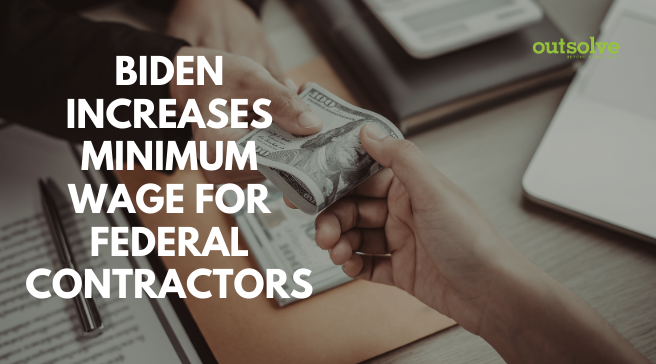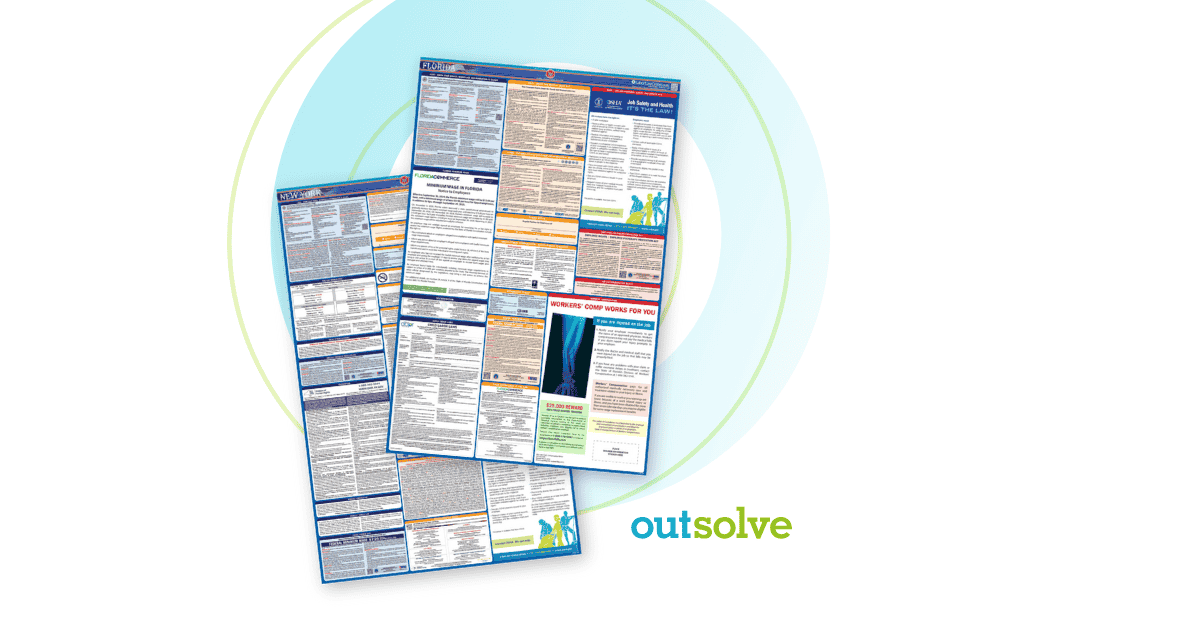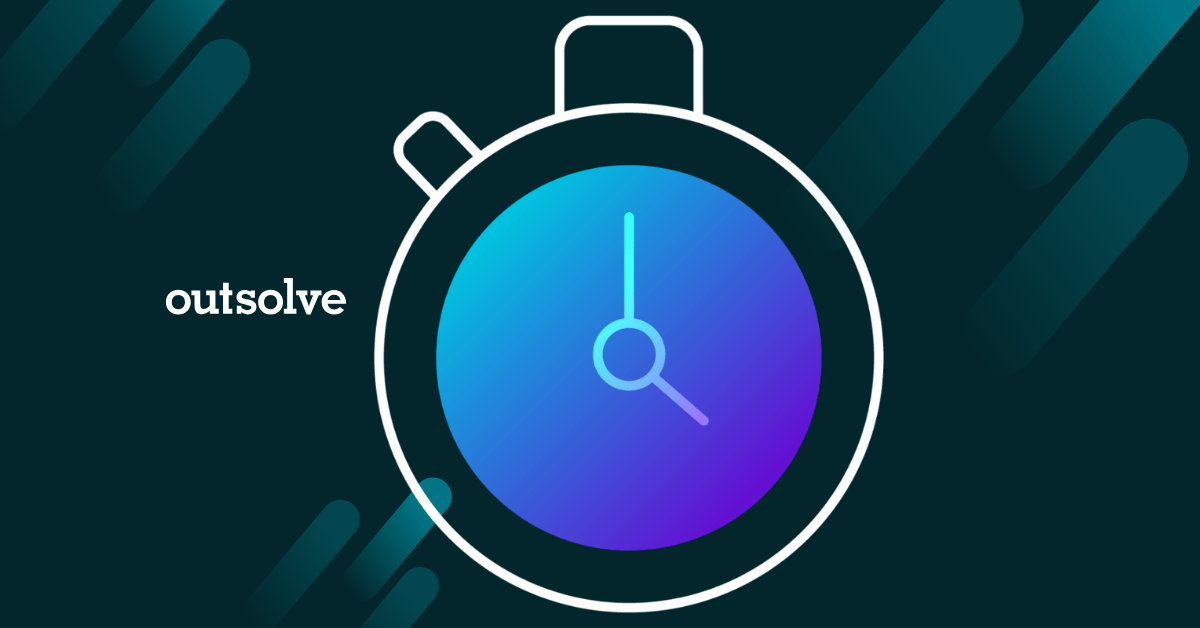3 min read
President Biden issues Executive Order to Increase Minimum Wage for Federal Contractors
![]() OutSolve
:
May 3, 2021 4:58:00 PM
OutSolve
:
May 3, 2021 4:58:00 PM

Minimum wage for employees of federal contractors increases to $15 per hour beginning January 30, 2022 and for tipped workers by January 1, 2024
On April 27, 2021, President Biden signed an Executive Order (E.O.) raising the minimum wage to $15 per hour for all companies holding federal contracts or subcontracts with agencies of the U.S. government. The order also ensures a $15 per hour minimum wage for federal contract workers with disabilities. Each year thereafter, beginning in 2023, the minimum wage will automatically adjust for inflation. This represents an increase from the current minimum of $10.95 per hour based on an E.O. signed by former President Obama. This order is effective immediately and shall apply to new contracts; new contract-like instruments; new solicitations; extensions or renewals of existing contracts; and exercises of options on existing contracts.
Section 2 – Increasing Minimum Wage for Federal Contractors and Subcontractors
Beginning January 30, 2022 all federal agencies will need to ensure that contracts include a clause that the contractor and subcontractors shall incorporate into lower-tier subcontracts. The clause shall indicate that, as a condition of payment, the minimum wage to be paid to employees employed in the performance of the contracts or any covered subcontract are calculated pursuant to be at least $15 per hour, beginning January 30, 2022. Beginning January 1, 2023 and annually thereafter, the Secretary of Labor will determine the new minimum wage and publish it at least 90 days prior to it taking effect.
Contract Coverage
The minimum wage is subject to the following four major categories of contractual agreements.
- Procurement contracts for services or construction covered by the Davis-Bacon Act (DBA);
- Service contracts covered by the Service Contract Act (SCA);
- Concessions contracts, including any concessions contract excluded from the SCA by regulations at 29 C.F.R. 4.133(b); and
- Contracts in connection with Federal property or lands and related to offering services for Federal employees, their dependents, or the general public. This includes minimum wage protections for outfitter and guides operating on federal lands by revoking an exemption created by President Trump.
For contracts or contract-like instruments covered by the SCA or the DBA, this E.O. shall apply only to contracts at the thresholds specified in these statutes. Worker’s wages that are governed by the FLSA shall apply only to procurement contracts that exceed the micro-purchase threshold, unless expressly made subject to this order pursuant to regulations.
This order does not apply to grants; contracts, or agreements with Indian Tribes under the Indian Self-Determination and Education Assistance Act (Public Law 93-638).
Methodology for setting wage rates beginning January 1, 2023
The DOL will determine the annual percentage increase in the Consumer Price Index for Urban Wage Earners and Clerical Workers (CPI-W) (United State city average, all items, not seasonally adjusted) or a successor publication published by the Bureau of Labor Statistics. Then they will compare and determine the change between the CPI-W for the most recent month, quarter, or year available with the CPI-W for the same month in the preceding year. Increases to the current minimum wage rate will be rounded to the nearest multiple of $0.05.
Employers shall keep in mind that “nothing in this order shall excuse noncompliance with any applicable Federal or State prevailing wage law, or any applicable law or municipal ordinance establishing a minimum wage higher than the minimum wage of $15 per hour established in this order.”
Section 3: Tipped Employees
Employees covered under section 2 of the E.O. who are tipped employees pursuant to the FLSA, the cash wage paid by an employer must be at least:
- $10.50 per hour, beginning January 30, 2022;
- Beginning January 1, 2023, 85% of the wage in effect under section 2 of this E.O., rounded to the nearest multiple of $0.05; and
- Beginning January 1, 2024, and each subsequent year thereafter, 100% of the wage in effect under section 2 of this order. This essentially eliminates the tipped minimum wage for federal contractors by 2024.
The amount of tips received by the worker must equal at least the difference between the cash wage paid and the minimum wage. If the worker does not receive enough tips, the contractor must increase the cash wage paid so that the combination of the two equals the minimum wage. Employers should also take note that if the wage required to be paid under the SCA or other applicable law is higher than the wage required under section 2 the employer shall pay additional cash wages sufficient to meet the highest wage required to be paid.
Regulations
To implement this order, the Secretary of Labor shall issue regulations by November 24, 2021. Within 60 days of the publication of the regulations:
- The Federal Acquisition Regulatory Council shall amend the Federal Acquisition Regulation (FAR) to provide for inclusion in Federal procurement solicitations, contracts and other instruments subject to their order.
- Agencies shall take steps to “exercise any applicable authority to ensure that contracts and contract-like instruments, entered into on or after January 30, 2022” comply with the requirements set forth in sections 2 and 3 of this order.
Enforcement
The Secretary of the Labor has the authority to investigate potential violations. How disputes regarding whether a contractor or subcontractor has paid the wages required by this order shall be outlined in the regulations.
For more information, refer to the Executive Order Fact Sheet.
Founded in 1998, OutSolve has evolved into a premier compliance-driven HR advisory firm, leveraging deep expertise to simplify complex regulatory landscapes for businesses of all sizes. With a comprehensive suite of solutions encompassing HR compliance, workforce analytics, and risk mitigation consulting, OutSolve empowers organizations to navigate the intricate world of employment regulations with confidence.
Recent Posts
Related Posts

Former DOL Officials Issue Open Letter to Federal Contractors
On April 15, 2025, ten former senior officials from the U.S. Department of Labor (DOL), including past leaders of the Office of Federal Contract...

The Ultimate Guide to Multi-State Labor Law Posters
Human Resources professionals understand how important and challenging it can be to remain updated and compliant with labor laws. This is especially...

Countdown: Final Days of the 90-Day Safe Harbor Period for AAPs
April is here and with that comes the end of the 90-day safe harbor period for federal contractors complying with EO 11246. As April 21, 2025,...


